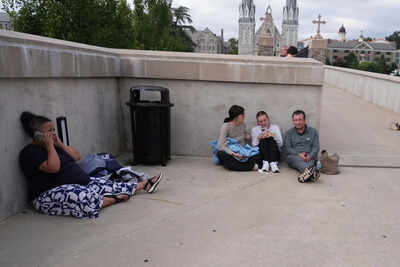ARTICLE AD BOX

Miceala Morano scrambled for cover behind a green screen in the University of Arkansas broadcast room after she received a campuswide alert about an active shooter.Outside, officers strapped on bulletproof vests, ready to confront a threat that didn’t exist.
Inside, the 21-year-old journalism student called her grandmother: “As of right now, I’m safe.
I love you,” she said.The terrifying lockdown was not triggered by a gunman, but by a hoax call. And it was not an isolated incident. According to the Associated Press, dozens of colleges across the United States have faced a wave of false reports, sometimes accompanied by fake gunfire sounds, that forced universities into lockdown and sent students cowering under desks.
Fear in the classroom
From the University of Arkansas to Northern Arizona University, Kansas State to the University of New Hampshire, and even Villanova University during its Orientation Mass, campuses have been hit by nearly identical calls about armed intruders with assault rifles.“There’s just these few minutes where all you really feel is fear, whether the threat’s there or not,” Morano told AP. Her childhood lessons in active shooter drills rushed back, barricading doors with chairs, climbing into ceilings, only this time, she had to live it for real.
For students like Villanova senior Ryan Scanlon, the hoax reopened old wounds. Having been near Parkland, Florida, during the 2018 Marjory Stoneman Douglas High School shooting, he told AP: “It’s really not funny. If you experience that real thing, you never know what can happen next.”
The anatomy of swatting
Swatting — a term used for false emergency calls designed to provoke an armed police response, has long been a law enforcement headache.
But shooter hoaxes on campuses represent its most chilling form.As AP reports, callers have described gunmen with AR-15 style rifles and even staged audio of gunshots in the background. The goal is chaos: Lockdowns, mass evacuations, and heavily armed officers storming academic buildings.The University of South Carolina also received two calls on Sunday reporting an active shooter at the school’s library, with gunshot sounds in the background.
“It could have been a lot worse than it was. Maybe next time it will be worse,” South Carolina Governor Henry McMaster warned, comparing the calls to yelling fire in a crowded theater.
Why campuses are vulnerable
Experts fear these hoaxes could desensitize students and staff to real threats. “We live in tornado alley where people hear a tornado warning and go outside to look,” said University of Arkansas instructor Mya Norman, who told AP she hid trembling under her desk. “So it does concern me that we could end up with that kind of an effect.”Ken Trump, president of National School Safety and Security Services, told AP that universities now face a “delicate balance”, keeping students alert to genuine risks without inducing panic at every notification.
Technology’s dark loophole
Part of the problem lies in how easy it has become to disguise one’s digital footprint. Fred Posner, a telephony consultant, explained to AP that advances in technology and lax phone carrier systems make it remarkably simple to obtain untraceable numbers.
“The only way for this to stop is to have some sort of enforcement and crackdown against the carriers that continually allow this to occur,” he said.The Federal Bureau of Investigation (FBI) has confirmed it is investigating the recent spate of campus swatting calls, noting similarities across multiple states. While the agency has not disclosed whether these are coordinated, a previous nationwide wave three years ago was traced to actors overseas.
Trauma that lingers
Even after the “all clear” is given, the fear doesn’t vanish. Students at Arkansas told AP they couldn’t sleep for hours after lockdown. Faculty, too, remain shaken. Norman admitted that a grim thought crossed her mind during the ordeal: “It’s kind of rotten but in some ways I thought, well, it’s our turn.”For 19-year-old Casey Mann, who hid alongside Morano, the episode has changed how she views college life. “It’s just a scary reality, the time we’re living in right now,” she said, her voice cracking. “It just makes me wonder what we’re supposed to expect in the future.”TOI Education is on WhatsApp now. Follow us here.



.png)
.png)
.png)
















 4 hours ago
3
4 hours ago
3








 English (US) ·
English (US) ·